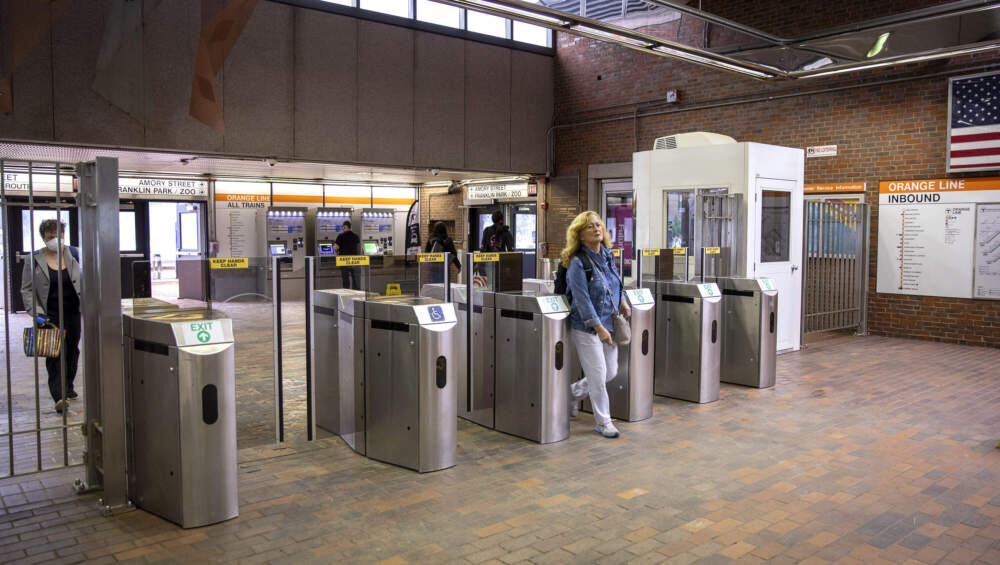Advertisement
Boston's Morning Newsletter
The MBTA is developing a low-income fare program. Here's how it would work

Editor's Note: This is an excerpt from WBUR's daily morning newsletter, WBUR Today. If you like what you read and want it in your inbox, sign up here.
Don’t let the clear skies fool you; it’s a chilly one out there today. While you continue to avoid driving anywhere close to Rhode Island, let’s get to the news:
After years of advocacy and internal debate, the MBTA is on the verge of launching discounted fares to low-income riders. During a MBTA Board of Directors meeting yesterday, T staff gave a preview of the program they’re envisioning in 2024. Here’s what we know:
- Who would benefit? The MBTA already offers half-price fares to students, low-income young adults and seniors. But there’s a big hole of low-income riders ages 26 to 64 who don’t get a discount. The new program would give a 50% fare discount to everyone in that age range who have incomes up to 200% of the federal poverty level, according to Steven Povich, the T’s director of fare policy and analytics. For a single individual, that means up to $29,000 a year, or $60,000 for a household of four.
- How would it work? The fare discounts would cover all MBTA modes: bus, subway, commuter rail, ferry and The Ride. Povich says those who enroll in the program would be mailed a special CharlieCard that, after being loaded with money, would only deduct half the price of a fare when tapped on a fare reader.
- For the commuter rail, T officials say riders would also be able to use the card to get the discount via fare vending machines, the mTicket app and onboard sales from conductors.
- How much would they save? It depends on the person. An MBTA rider with a monthly pass would save $720 a year. Meanwhile, commuter rail users could save even more; for example, a monthly pass holder going between Framingham and Boston would save $1,908.
- How do I sign up? The T hopes to create a five-minute online application that could use data from the RMV and the state Office of Health and Human Services (which administers several social safety net programs) to verify people’s identity and income. Povich said they’re also hoping to partner with a local community group to set up in-person applications for those who can’t (or don’t want to) apply online.
- What’s next: If approved, the program’s launch is still months away. MBTA staff are hoping to present their official proposal as soon as next month. After a 45-day public comment period and board vote, Povich estimates it would be another two to six months to actually implement the program.
- Why not just make the T free for everyone? It's a simpler option. However, Povich contended that low-income fares are a more efficient way to increase ridership without sacrificing too much revenue. "Service, safety and reliability are certainly the most important factors for riders across the economic spectrum," he said, adding that fares matter more as an incentive for low-income riders.
- Counterpoint: Mary Skelton Roberts, Boston’s representative on the MBTA board, questioned that argument. She asked MBTA staff to take a closer look at the long-term costs of setting up and administering the low-income fare program, compared to just making fares free. "We’ve spent I-don’t-even-know-how-many millions of dollars on [a fare modernization] program that isn’t even implemented yet," Roberts said. Povich responded saying he'd be "happy" to return later with a more in-depth analysis on the subject.
- By the numbers: In the coming year, the MBTA expects to collect $420 million in fares — around 16% of the agency's total revenue.
The Massachusetts Department of Public Health is calling on state lawmakers to make it easier for local communities to open supervised consumption sites. As WBUR’s Martha Bebinger reports, DPH released a report yesterday calling the controversial sites “an effective means of reducing overdoses and fatalities.” But since the sites violate federal law, DPH said they would not be feasible for a municipality to open without at least some new state-level liability protections.
- Zoom out: The report was released alongside the latest statewide overdose death numbers, which remain at grim record highs.
The new police union contract wasn’t the only thing the Boston City Council approved during its final meeting of the year yesterday. WBUR’s Simón Rios reports councilors also passed a home rule petition that would let the city’s thousands of non-citizen residents (who often work and pay taxes in Boston) vote in local elections.
- The measure is still a long way from becoming reality. In order to take effect, the home rule petition needs to be approved by Mayor Michelle Wu, the State House and Gov. Maura Healey. Cambridge, Newton and Somerville have all passed similar measures, which are now languishing amid inaction from the State House.
Provincetown is joining a small list of Massachusetts communities that have effectively decriminalized psychedelic mushrooms. This week, the P-town Select Board passed a measure instructing police to de-prioritize cases involving psilocybin.
- Zoom out: Cambridge, Easthampton, Northampton, Salem and Somerville have also passed similar ordinances, ahead of a potential 2024 ballot measure that could legalize psychedelic therapy across Massachusetts.
P.S.— Though we won’t be eating KFC or hosting any fistfights, WBUR’s own unique Christmas tradition is right around the corner. Come join your favorite WBUR hosts and reporters next Tuesday at CitySpace for our annual reading of “A Christmas Carol.” We promise there’ll be lots of complimentary cookies, hot cocoa and cozy feels.
